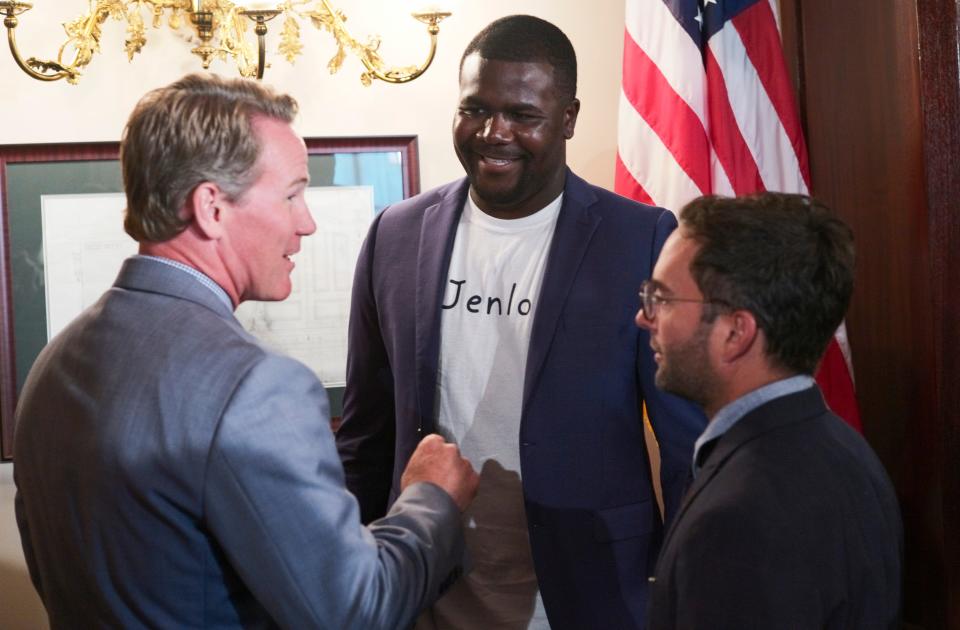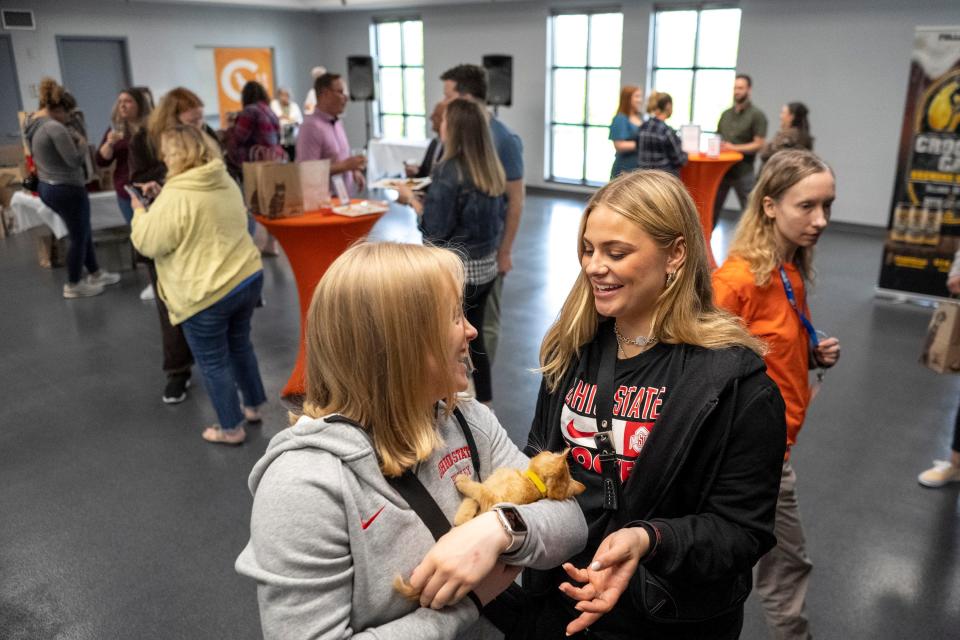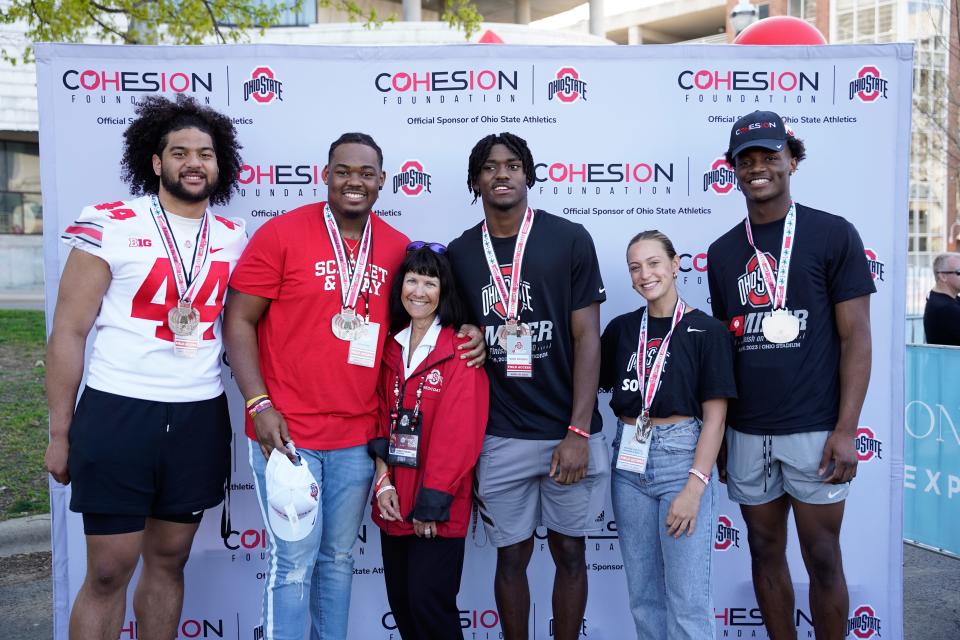Ohio State nonprofit NIL collectives to move in opposite directions after IRS memo
A recently released memorandum by the Internal Revenue Service is poised to put the longest-running name, image and likeness collectives supporting Ohio State on different paths.
The federal tax agency’s legal memo, which was drafted in May before being disclosed on June 9, casts doubt on the tax-exempt status of nonprofit collectives across college sports’ ever-evolving NIL landscape, a group that includes the Cohesion Foundation and THE Foundation.
Both entities associated with OSU received 501(c)(3) designations from the IRS last year after they were established to pay Buckeyes athletes in exchange for working with charitable organizations around Columbus.
“It’s not only a game-changer,” said Gary Marcinick, the founder and president of the Cohesion Foundation, “it looks to be a game-ender.”
Marcinick, a financial advisor and former walk-on football player for the Buckeyes, said the collective is no longer soliciting donations and expects it to cease operations at the end of this year, an event he describes as a “strong likelihood.”

As part of its appeal to donors, Cohesion has pitched an ability to claim deductions for contributions on tax filings, a practice now in jeopardy as a result of the IRS’ growing scrutiny into the sector.
In an interview earlier this year, Marcinick said a majority of donations originated from high-net worth individuals who were drawn by the tax deduction as the foundation raised in excess of a couple million dollars.
“If you take away our tax-exempt status, that’s ripping out our heart,” Marcinick said last week.
Marcinick, who is also a strategic advisor for The 1870 Society, the new for-profit collective backing Ohio State athletes, said he would continue to raise money for the school’s athletic programs in the NIL space after his group folds.
The response by Cohesion stands in contrast to THE Foundation, which has not modified its operations.
Brian Schottenstein, a real estate executive who co-founded THE Foundation with former Ohio State national championship-winning quarterback Cardale Jones, said the entity is continuing to offer tax-deductible donations.
“We're doing everything the right way,” Schottenstein said. “We're just going to continue to run business as usual. Really not going to change anything. There’s no need to.”
More: From nonprofits to for-profits: Inside the evolution of Ohio State’s NIL collective market
The IRS’ 12-page memo, as authored by Lynne Camillo, a deputy associate chief counsel for exempt organizations and employment taxes, takes issue with the disbursement of donations by nonprofit collectives.
It notes some reserve as much as 80-100% of donations for athletes, who promote their partner charities on social media and through public appearances. Student-athletes are not considered a charitable class under the 501(c)(3) section of the tax code.
“An organization that develops paid NIL opportunities for student-athletes will, in many cases, be operating for a substantial nonexempt purpose — serving the private interests of student-athletes — which is more than incidental to any exempt purpose furthered by the activity,” the memo reads.
The opinion concludes many of these nonprofit collectives are not tax exempt as a result.
Though the document itself does not revoke their tax-exempt status and is not to be cited as precedent, it portends the possibility of future action by the agency, steps that include examinations and reviews that could lead to the loss of exemptions.
“My guess is because the IRS issued this letter, the IRS has to be contemplating or has already opened audits into these types of organizations,” said Phil Hackney, a tax law professor at the University of Pittsburgh who previously served in the IRS chief counsel’s office.

The impending enforcement has made Marcinick reluctant to continue the Cohesion Foundation beyond this year.
Marcinick is proud of his group’s efforts over the past 14 months, calling the foundation’s work “exemplary” as it’s worked with a wave of charities in central Ohio.
“I’m very proud of what we were able to pioneer, create and execute,” he said. “I truly think there’s not another example around the country who did this better than we did.”
But he sees maintaining its tax-exempt status as an uphill battle moving forward.
It hardly strengthened the resolve of Marcinick or his board of directors when NCAA president Charlie Baker publicly sided with the IRS in the days after its review of nonprofit collectives became public.
“We don’t have the resources or the time to fight the IRS or the president of the NCAA,” Marcinick said.
Cohesion will operate through December alongside its partner charities and athletes, which include 26 Ohio State football players, along with others participating in Olympic sports for the school.
Enough money has been raised to fulfill its existing contracts.
By making plans to shut down at the year’s end, Marcinick is looking for the nonprofit collective to dissolve in an organized manner.
“I’d rather be preemptive,” Marcinick said, “and in full control of our exit than have our hand forced any day now.”

If THE Foundation’s tax-exempt status becomes at risk, Schottenstein said he plans to restructure the organization by turning it into a limited liability company, or LLC, with proceeds remaining dedicated to football and men’s basketball. None of their executives would draw salaries.
“We could still do charitable work in the community,” Schottenstein said. “The only difference would be the individual donor would not get a tax deduction.”
Schottenstein doesn’t see a potential deduction loss as something likely to dissuade donors from supporting his group. In the aftermath of the IRS memo, few have raised it as an issue with him.
He also expects interest to remain high as THE Foundation backs the two most high-profile sports on campus.
“A lot of the big donors are wanting to support us,” Schottenstein said, “because we’re supporting the Ohio State football and basketball players and they’re giving back to the community and maybe aren’t quite as worried or doing it for the deduction.”
Restructuring the Cohesion Foundation is less appealing to Marcinick, as he was earlier involved in the formation of The 1870 Society, which formally launched in April.
The establishment of a for-profit collective stemmed from a desire to attract more corporate contributions that could fund NIL opportunities for Ohio State athletes across a variety of sports. As of last month, The 1870 Society was working with athletes from 14 varsity sports.
But Marcinick also recognized the possibility of nonprofits inviting scrutiny as they emerged in a developing NIL market.
“I knew it was important to diversify,” Marcinick said, “and as it turns out, it played out that way. Now I truly think 1870 is the most sensible, credible and formidable place to manage this space for Ohio State athletics.”
Joey Kaufman covers Ohio State football for The Columbus Dispatch. Contact him at jkaufman@dispatch.com or on Twitter @joeyrkaufman.
Get more Ohio State football news by listening to our podcasts
This article originally appeared on The Columbus Dispatch: Ohio State NIL collectives to go in opposite directions after IRS memo

